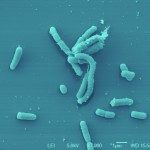Lien vers Pubmed [PMID] – 33024008
Lien DOI – vetrec-2020-10594510.1136/vr.105945
Vet Rec 2020 Oct; ():
Listeria monocytogenes is a foodborne bacterial pathogen that causes listeriosis, an infectious disease in animals and people, with pigs acting as asymptomatic reservoirs. In August 2019 an outbreak associated with the consumption of pork meat caused 222 human cases of listeriosis in Spain. Determining the diversity as well as the virulence potential of strains from pigs is important to public health.The behaviour of 23 L monocytogenes strains recovered from pig tonsils, meat and skin was compared by studying (1) internalin A, internalin B, listeriolysin O, actin assembly-inducing protein and PrfA expression levels, and (2) their invasion and intracellular growth in eukaryotic cells.Marked differences were found in the expression of the selected virulence factors and the invasion and intracellular replication phenotypes of L monocytogenes strains. Strains obtained from meat samples and belonging to serotype 1/2a did not have internalin A anchored to the peptidoglycan. Some strains expressed higher levels of the studied virulence factors and invaded and replicated intracellularly more efficiently than an epidemic L monocytogenes reference strain (F2365).This study demonstrates the presence of virulent L monocytogenes strains with virulent potential in pigs, with valuable implications in veterinary medicine and food safety.

